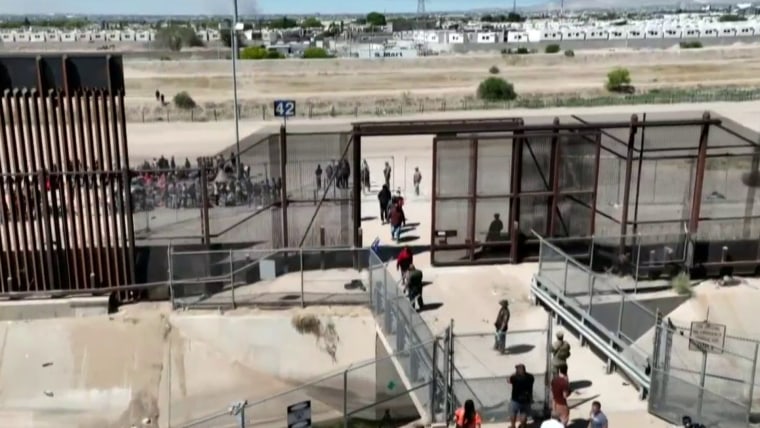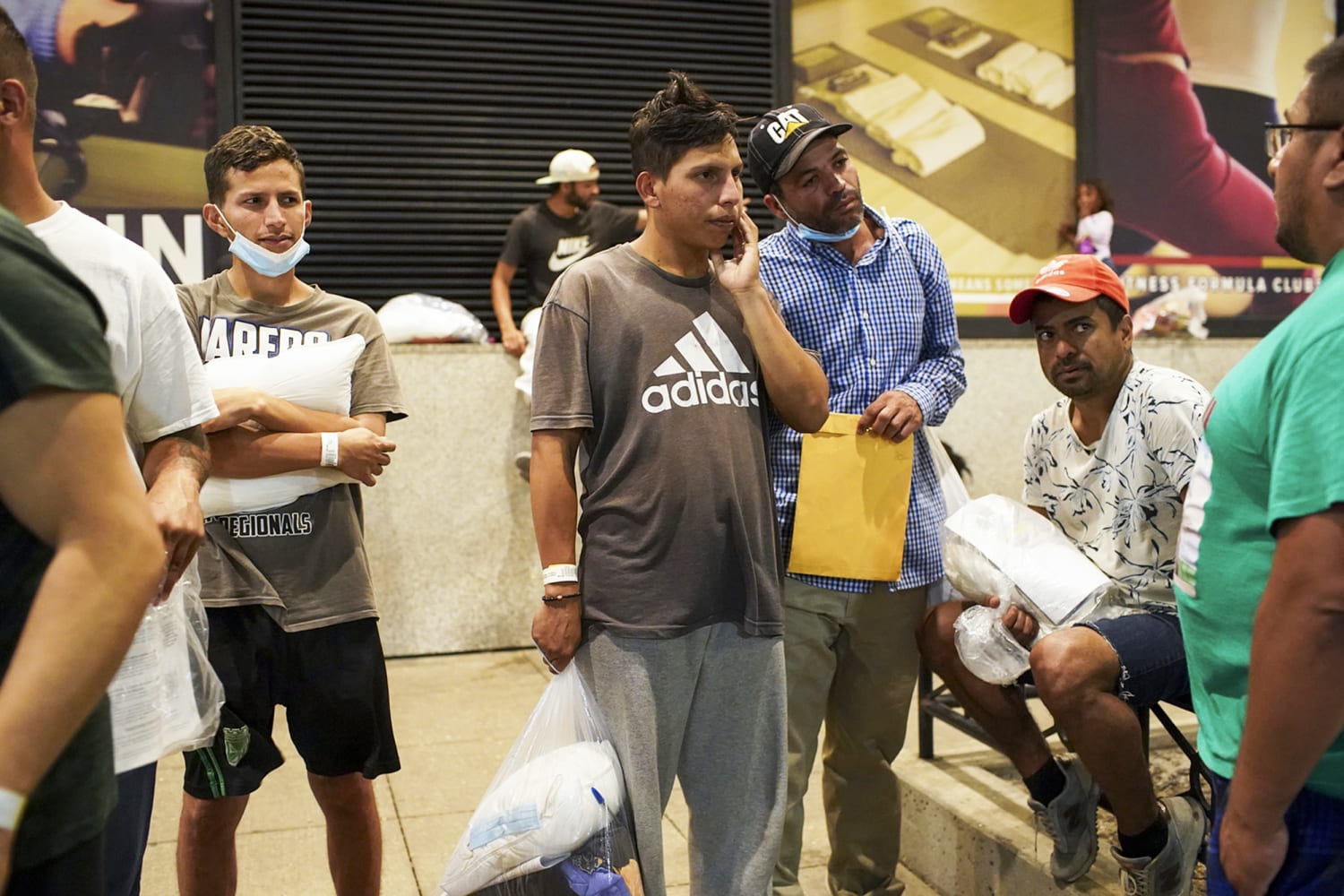CHICAGO — The city here is so overwhelmed by an influx of migrants that it has issued a state of emergency. New York Gov. Kathy Hochul has done the same. Philadelphia is bracing for a new stream of buses carrying migrants. And New York City Mayor Eric Adams temporarily suspended the city’s right-to-shelter law.
The migrant crisis fueled by the end of the Covid-era immigration restrictions known as Title 42 isn’t just hitting border towns —it extends more than 1,000 miles from the nation’s southern border.
And it all has the eyes of the nation focused squarely on the White House as the policy ends Thursday night.
The left and right flanks of the immigration debate, who see eye to eye on nothing else, agree that President Joe Biden has mismanaged this crisis. Not only does it touch on the lightning rod issue of immigration but it gets at the issue of Biden’s competence, with critics saying it recalls the botched withdrawal from Afghanistan.
“It’s a big problem for Biden. Forget about states like New York and Illinois, where he’ll win. There’s a sense that things are out of control. Throw crime on top of it and you have a recipe for a computable disaster,” said Hank Sheinkopf, a New York City Democratic strategist. “People hate when things are out of control. No matter who is the president, when things are out of control, the president tends to lose.”
The impact is extending deep into the states, a phenomenon exacerbated by Texas Gov. Greg Abbott. Abbott has said his front-line border towns are bursting at the seams and is sending migrants on buses — something he began unannounced last fall — to northern cities that have deemed themselves sanctuary cities.
It’s a political no-win situation for the White House, which is stuck between its immigration activists allies on one side — who famously dubbed former President Barack Obama the “deporter-in-chief” — and conservatives’ desire for a crackdown as the migrant tent camps grow far from the border. Biden has taken some steps to prepare for a steep increase in asylum applications, including setting up processing centers in Guatemala and Colombia — before migrants reach the U.S.-Mexico border.
Title 8, the immigration law enforced before the pandemic, will go into effect once Title 42 is lifted. Title 8 allows immigrants to apply for ways to enter the U.S. legally and also levies penalties for attempted illegal border crossings.
Still, advocates complain housing crises are building to a crescendo, social service agencies are stretched to their limits, city and state budgets are getting blown up and local officials are grappling with pushback from their constituencies.
“Everybody is at capacity,” said Maria Del Rosario Salgado, a Department of Justice-accredited representative at the Centro Romero legal assistance fund in Chicago. “There’s not sufficient food. Some of our staff is donating time, cooking batches of rice or beans. Some of them are telling us, they haven’t had one meal, they don’t have blankets or pillows … the police stations are reaching out to us. We have nowhere to send them because the shelters are out of space.”
New York City is so stretched for housing it has considered shutting down streets and erecting temporary housing to take in potentially hundreds of migrants a day.
“The national government has turned its back on New York City,” Adams said in April. “The president and the White House have failed New York City on this issue.”
New York City social service advocates say they’re running out of physical space to house the migrants, whose impact is being felt in all kinds of ways. For example, Win, an organization that helps provide family shelter and housing in New York City, has had such a rapid increase of the number of people in its shelters — including 700 children alone — it’s had to buy five additional refrigerators since the fall. Christine Quinn, president and CEO of Win, said there’s no excuse for the flat-footed nature of the response now, given that the May 11 deadline had been looming.
“We really should have had comprehensive, all-hands-on-deck plans developed and implemented — and that is really lacking,” Quinn said.
The White House did not immediately comment.
The strain is being felt as far away from the southern border as Maine, which shares a 600-mile frontier with Canada. More than 1,000 migrants have arrived in Portland since the start of the year and officials there say they’re already at capacity.
“We know that the city of Portland and surrounding communities are struggling to help so many people,” Martha Stein, the executive director of the nonprofit Hope Acts told local media. “And this is playing out all over the country.”
Title 42 allowed the Border Patrol to quickly expel asylum-seekers, without providing them access to the process to which would-be refugees are entitled to under normal circumstances.
The policy was used more than 2.8 million times to turn away migrants, according to Border Patrol data, creating a massive backlog that officials say could now result in up to 13,000 migrants a day seeking asylum at the border.
Democrats blasted former President Donald Trump when he invoked Title 42 during Covid, but Democratic lawmakers are not celebrating now that it’s finally going away.
Progressive Rep. Raul Grijalva, D-Ariz., sees Title 42 as “nativist effort to stop the entry of migrants fleeing persecution and violence from their legal right” and “not a lawful border policy.” But he said in a statement Thursday that, “While the Biden administration has given its best effort to prepare for the lifting of Title 42, it’s clear they’ve fallen short.”
Moderate Democratic Rep. Colin Allred of Texas, who just launched a high-profile campaign against Republican Sen. Ted Cruz, used the same language to say Biden has “has fallen short on getting Texas border communities the support they need.”
Chuck Rocha, a top Latino Democratic strategist, blamed Republicans for “sitting back with their arms crossed” instead of passing legislation to help, but said they’re trying to gin up their base and scare swing voters.
“The Republicans are putting together a messaging war that’s not targeted to Latino voters. They’re trying to scare white suburban voters in Pennsylvania, Wisconsin and Michigan by saying that there are these people — bad people in their opinion, coming to this country to do bad things — and they’re coming to your neighborhood,” Rocha said.
Rocha said he didn’t think Republicans would succeed in the long run, though he acknowledged that “in the first few days, because there is a backlog, there will be visuals that will not be good for anyone to see.”
And Rocha said immigration activists might give Biden a bit more leash thanks in part to his recent selection of Julie Chávez Rodríguez, the granddaughter of famed farmworker organizer Cesar Chavez, to run his re-election campaign.
“It’s hard for me to see immigration activists personally going against this campaign in the same way when you have Julie Chavez as its face,” Rocha said.
But Quinn, from New York City’s Win, said both short-term and long-term solutions have got to come into view — and quickly.
“People think that they’re gonna go to sleep and we’re gonna wake up and everyone’s just gonna be gone,” she said. “It’s not going to work that way. These are people who fled through raging waters to get to anywhere that wasn’t their country.”
Source: | This article originally belongs to Nbcnews.com











